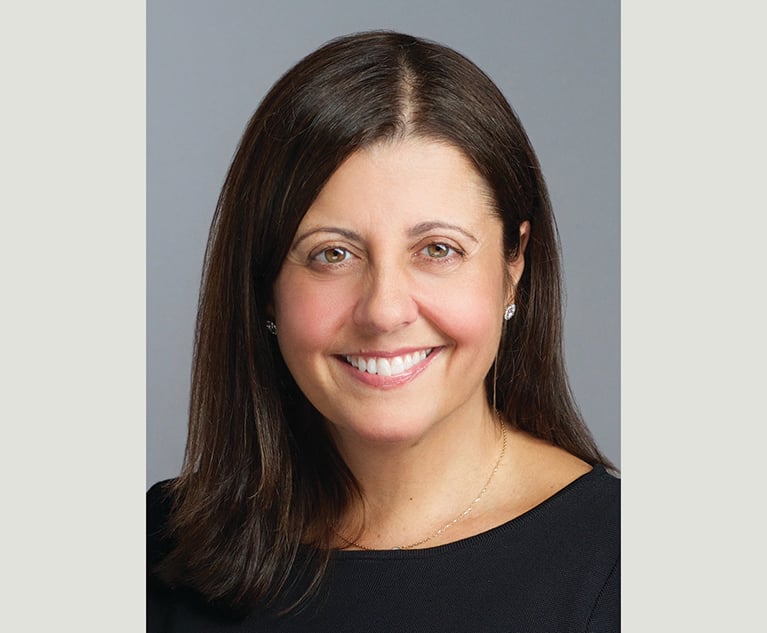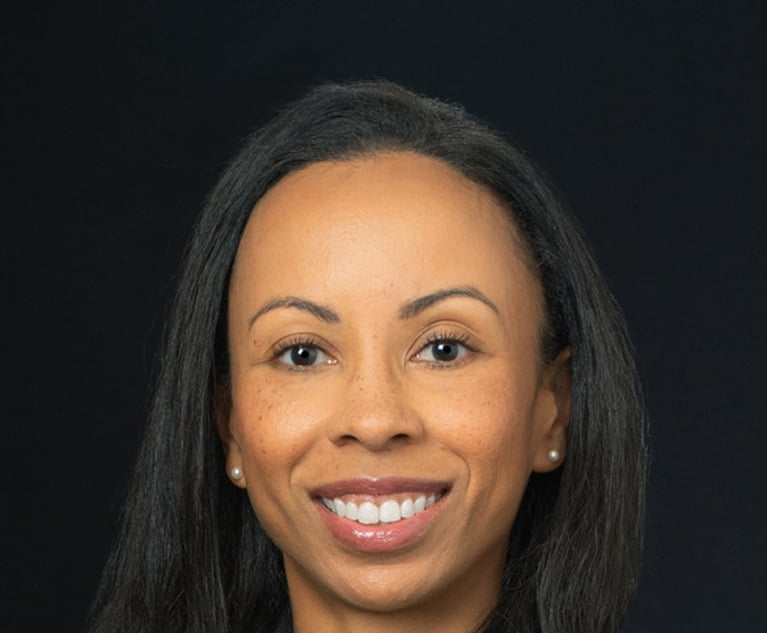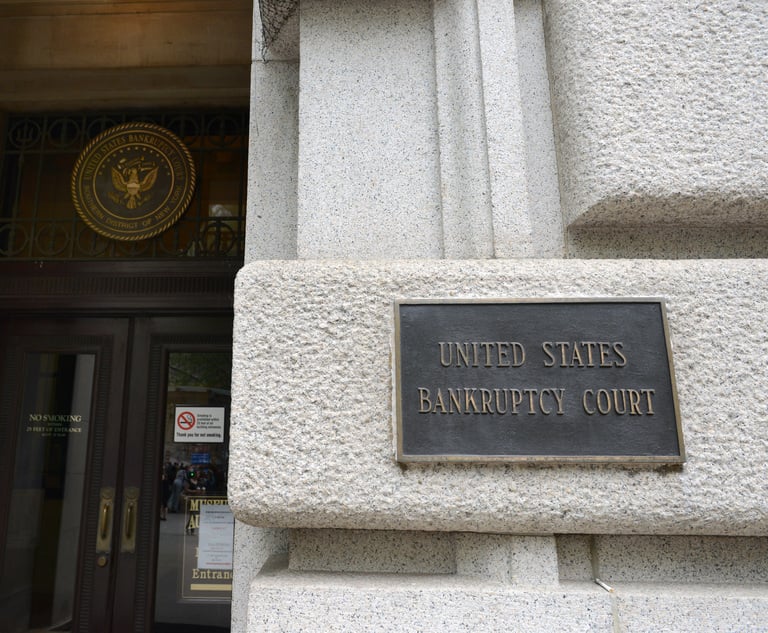Manhattan US Attorney Berman Will Remain, SDNY Court Says
Berman, who was neither nominated by President Trump nor confirmed by the U.S. Senate, was set to see his term as an appointee end next week.
April 25, 2018 at 03:29 PM
4 minute read

Geoffrey Berman, U.S. Attorney General Jeff Sessions' pick to be the U.S. attorney for the Southern District of New York, will remain in his position when his term as an appointee ends next week, court officials in the Southern District said Wednesday.
In a statement, Berman said he was notified by Chief Judge Colleen McMahon earlier in the day that, pursuant to the court's statutory abilities, he would continue to serve.
“I thank the court and I am grateful for its confidence in me,” Berman said. “I look forward to continuing the great tradition of this office to pursue justice without fear or favor. I consider it the honor of a lifetime and the greatest responsibility to serve the people of New York and the United States as U.S. attorney.”
Without the nomination of President Donald Trump, or the requisite confirmation by the U.S. Senate, Berman's status as U.S. attorney has remained in question. Federal law provides the district court the ability to name a replacement for an appointed, but unconfirmed, U.S. attorney after 120 days. According to the executive office of the Southern District of New York, that deadline was May 4.
A spokesman for the district court declined to comment beyond the announcement released Wednesday.
The board of judges for the district was scheduled to hold its regular meeting Wednesday, and the issue of Berman's looming deadline was expected to be discussed, according to sources with knowledge of the situation.
With the court's support, Berman will now remain U.S. attorney until someone is nominated by the president and confirmed by the Senate—an issue of if, not necessarily when.
Berman's situation was anticipated from the moment he stepped into the job in January. Berman appeared in August 2017 as the candidate to take over the position made empty by Trump's firing of Preet Bharara five months earlier. Yet after it became public that he'd met personally with the president to discuss the position, new political considerations entered the already slow-motion Congressional nominee confirmation process.
These external dynamics appeared to inform a letter sent to colleagues by McMahon on the occasion of Berman's appointment by Sessions. In a copy obtained by the New York Law Journal, McMahon notified people the day of Berman's appointment that if it “appear[ed] likely” that no one would be nominated and confirmed before the end of Berman's 120 days, it would be up to the court to name an interim U.S. attorney.
McMahon's view was given greater credence a week after Berman was named, when New York Democratic Sen. Kirsten Gillibrand stated publicly, through a spokesman, that she intended to block Berman's nomination, should Trump make it. Gillibrand's spokesman called Trump's personal interview of Berman “deeply disturbing considering the conflicts of interest inherent by [Berman's] potential jurisdiction on matters that could affect the president personally.”
In a statement, Gillibrand senior adviser Glen Caplin said the court has acted “responsibly within the law,” but called it “troubling” that the president “continues to attempt to undermine our institutions by doing an end-run around the U.S. Senate's advise and consent responsibility for U.S. attorney nominations.”
Concerns over Berman's handling of issues related to the president that come through the Southern District faced its first test when news broke that federal agents had executed a warrant on Trump's personal attorney, Michael Cohen, earlier this month.
According to reports, Berman voluntarily recused himself from the investigation, which was approved at the highest levels of the Department of Justice.
Prior to becoming U.S. attorney, Berman was a shareholder in Greenberg Traurig's New Jersey office, where he focused on white-collar defense. During his time there, he was a colleague of former U.S. attorney and current Trump legal team member, Rudy Giuliani.
Previously, Berman was a prosecutor in the Manhattan U.S. Attorney's Office from 1990 to 1994.
While unusual, Berman's appointment-by-court is not unprecedented. Former U.S. Attorney David Kelley, now a partner at Dechert, took over the office after his former boss, James Comey, departed to become deputy attorney general in late 2003. According to Southern District records, Kelley was appointed to remain in the position under the same federal statute as Berman in April 2004. He remained in the position until Michael Garcia was nominated by former president George W. Bush and confirmed by the Senate in September 2005.
This content has been archived. It is available through our partners, LexisNexis® and Bloomberg Law.
To view this content, please continue to their sites.
Not a Lexis Subscriber?
Subscribe Now
Not a Bloomberg Law Subscriber?
Subscribe Now
NOT FOR REPRINT
© 2024 ALM Global, LLC, All Rights Reserved. Request academic re-use from www.copyright.com. All other uses, submit a request to [email protected]. For more information visit Asset & Logo Licensing.
You Might Like
View All
Patent Trolls Come Under Increasing Fire in Federal Courts

Trade Fixtures in New York Eminent Domain Cases—What Qualifies and How Are They Valued?
10 minute read
Attorneys ‘On the Move’: Morrison Cohen Adds White Collar Partner; Corporate/Securities Partner Joins Olshan
6 minute readTrending Stories
Who Got The Work
Michael G. Bongiorno, Andrew Scott Dulberg and Elizabeth E. Driscoll from Wilmer Cutler Pickering Hale and Dorr have stepped in to represent Symbotic Inc., an A.I.-enabled technology platform that focuses on increasing supply chain efficiency, and other defendants in a pending shareholder derivative lawsuit. The case, filed Oct. 2 in Massachusetts District Court by the Brown Law Firm on behalf of Stephen Austen, accuses certain officers and directors of misleading investors in regard to Symbotic's potential for margin growth by failing to disclose that the company was not equipped to timely deploy its systems or manage expenses through project delays. The case, assigned to U.S. District Judge Nathaniel M. Gorton, is 1:24-cv-12522, Austen v. Cohen et al.
Who Got The Work
Edmund Polubinski and Marie Killmond of Davis Polk & Wardwell have entered appearances for data platform software development company MongoDB and other defendants in a pending shareholder derivative lawsuit. The action, filed Oct. 7 in New York Southern District Court by the Brown Law Firm, accuses the company's directors and/or officers of falsely expressing confidence in the company’s restructuring of its sales incentive plan and downplaying the severity of decreases in its upfront commitments. The case is 1:24-cv-07594, Roy v. Ittycheria et al.
Who Got The Work
Amy O. Bruchs and Kurt F. Ellison of Michael Best & Friedrich have entered appearances for Epic Systems Corp. in a pending employment discrimination lawsuit. The suit was filed Sept. 7 in Wisconsin Western District Court by Levine Eisberner LLC and Siri & Glimstad on behalf of a project manager who claims that he was wrongfully terminated after applying for a religious exemption to the defendant's COVID-19 vaccine mandate. The case, assigned to U.S. Magistrate Judge Anita Marie Boor, is 3:24-cv-00630, Secker, Nathan v. Epic Systems Corporation.
Who Got The Work
David X. Sullivan, Thomas J. Finn and Gregory A. Hall from McCarter & English have entered appearances for Sunrun Installation Services in a pending civil rights lawsuit. The complaint was filed Sept. 4 in Connecticut District Court by attorney Robert M. Berke on behalf of former employee George Edward Steins, who was arrested and charged with employing an unregistered home improvement salesperson. The complaint alleges that had Sunrun informed the Connecticut Department of Consumer Protection that the plaintiff's employment had ended in 2017 and that he no longer held Sunrun's home improvement contractor license, he would not have been hit with charges, which were dismissed in May 2024. The case, assigned to U.S. District Judge Jeffrey A. Meyer, is 3:24-cv-01423, Steins v. Sunrun, Inc. et al.
Who Got The Work
Greenberg Traurig shareholder Joshua L. Raskin has entered an appearance for boohoo.com UK Ltd. in a pending patent infringement lawsuit. The suit, filed Sept. 3 in Texas Eastern District Court by Rozier Hardt McDonough on behalf of Alto Dynamics, asserts five patents related to an online shopping platform. The case, assigned to U.S. District Judge Rodney Gilstrap, is 2:24-cv-00719, Alto Dynamics, LLC v. boohoo.com UK Limited.
Featured Firms
Law Offices of Gary Martin Hays & Associates, P.C.
(470) 294-1674
Law Offices of Mark E. Salomone
(857) 444-6468
Smith & Hassler
(713) 739-1250







